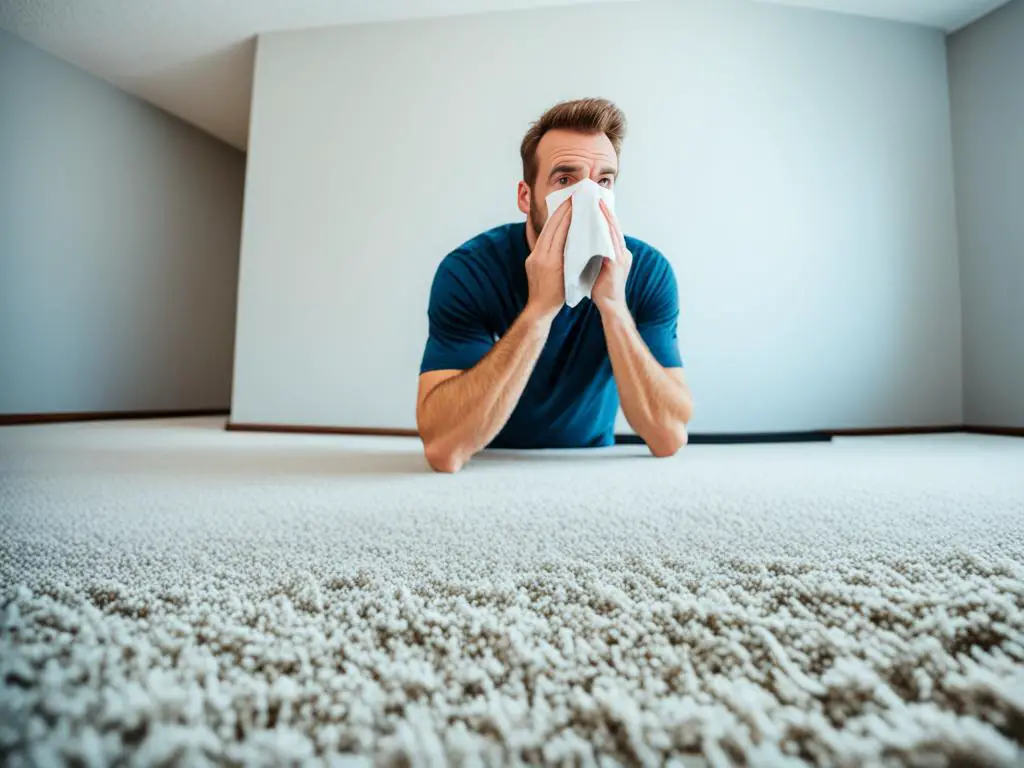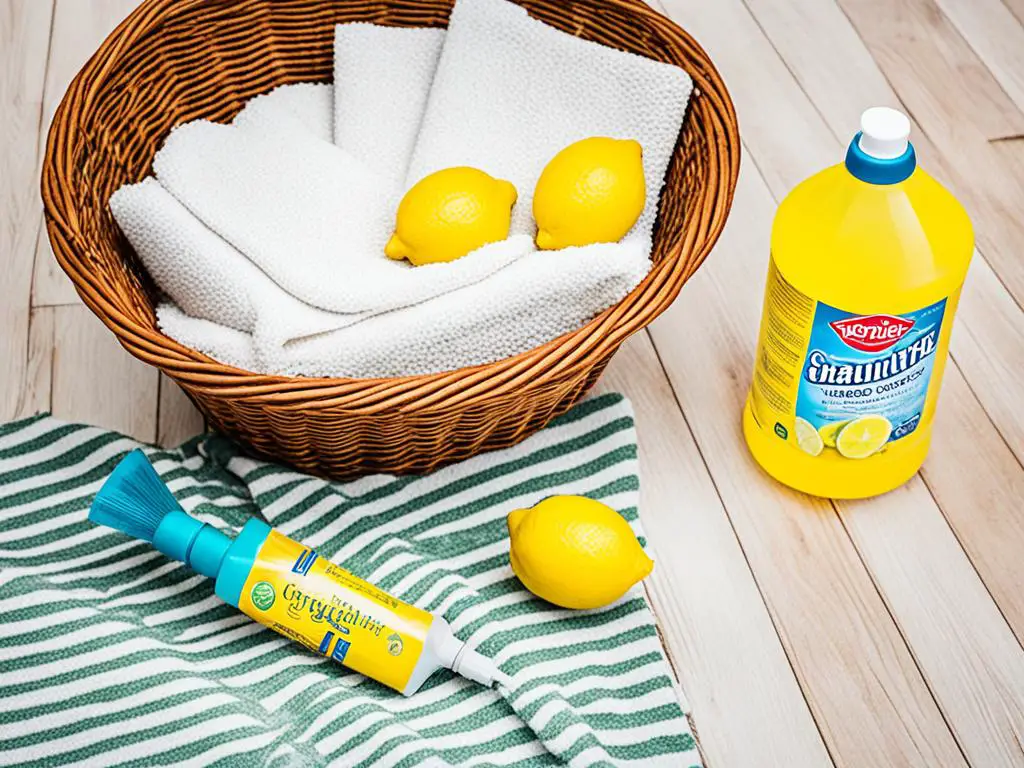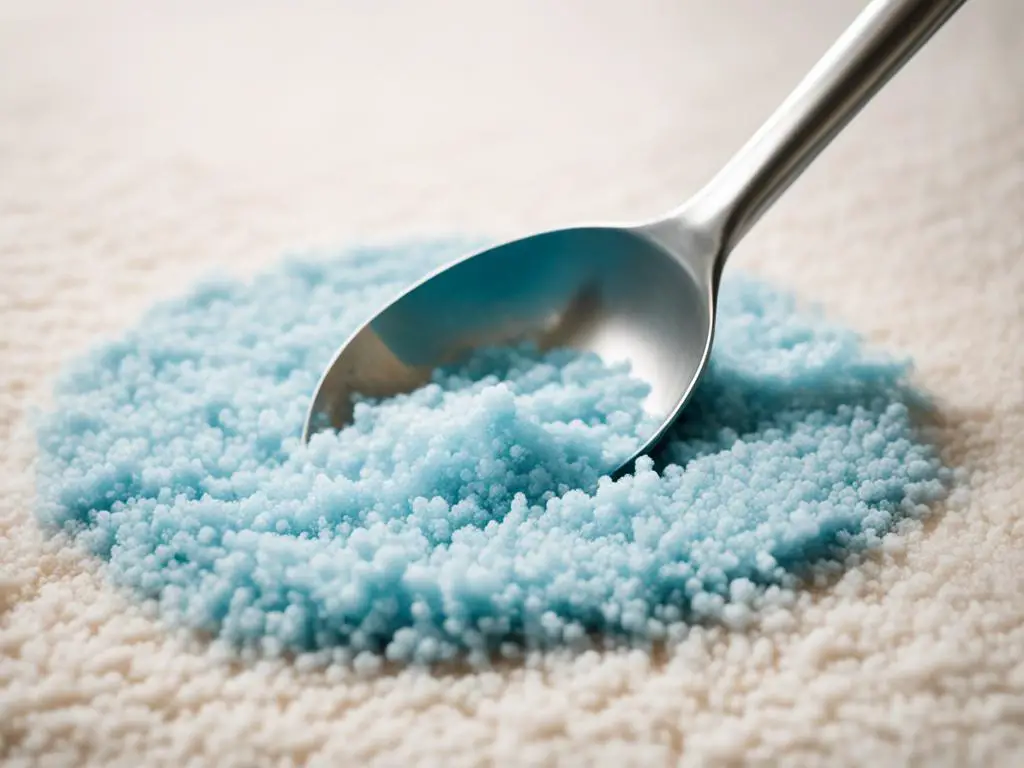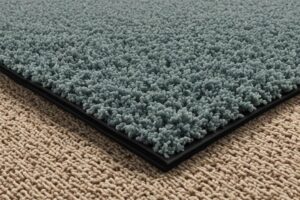Are you struggling with the unpleasant smell of carpet glue in your home? The odor can be overwhelming and difficult to eliminate. However, with the right techniques, you can successfully get rid of carpet glue smell and enjoy a fresh and odor-free living space.
Key Takeaways:
- Carpet glue smell is caused by Volatile Organic Compounds (VOCs) released during carpet installation.
- Choose a carpet with low emission chemicals and allow it to off-gas in a well-ventilated room before installation to minimize the smell.
- Increased ventilation, such as opening windows and using fans, can help eliminate the odor.
- Utilize natural remedies like baking soda and vinegar to absorb and neutralize the smell.
- Regular vacuuming and steam cleaning can remove any lingering odor.
Why Does My New Carpet Smell?
The smell of new carpet is a common concern for homeowners. When you bring a new carpet into your home, you may notice a distinct odor that can linger for several days or even weeks. But have you ever wondered why your new carpet smells the way it does?
The answer lies in the release of Volatile Organic Compounds or VOCs. VOCs are chemicals that are commonly used in the manufacturing of household products, including carpets. These chemicals evaporate at room temperature and enter the air, creating the new carpet smell that many people are familiar with.
While the new carpet smell may be unpleasant, it’s important to note that the VOCs released from carpets are generally at low levels and considered safe for indoor environments. However, some individuals may be more sensitive to these chemicals than others, and prolonged exposure to high levels of VOCs can potentially cause health issues.
To mitigate the new carpet smell and minimize your exposure to VOCs, there are a few steps you can take. First, choose a carpet with low emission chemicals when making your purchase. Look for carpets that are labeled as low-VOC or Green Label Plus certified, as these indicate that the carpet emits fewer chemicals into the air. It’s also a good idea to allow the carpet to “off-gas” in a well-ventilated room before installation, as this can help dissipate the odor.
In addition to these precautions, proper ventilation is key to reducing the new carpet smell. Open windows and doors to bring in fresh air, use fans to circulate the air, and consider running the air conditioner or heater to increase air circulation. This will help to remove the VOCs from the indoor environment more quickly.
Understanding Volatile Organic Compounds (VOCs)
Volatile Organic Compounds, or VOCs, are carbon-based chemicals that easily evaporate at room temperature. They are commonly found in a variety of household products, including paints, cleaning agents, and furniture. While VOCs can contribute to indoor air pollution and have been linked to various health effects, it’s important to note that the levels of VOCs emitted by new carpets are generally low and within acceptable limits.

“The smell of a new carpet is caused by the release of Volatile Organic Compounds or VOCs, which are commonly used in the manufacturing of household products.”
Getting Rid of That New Carpet Smell
To minimize the new carpet smell and eliminate carpet odor, there are several effective steps you can take. First and foremost, it’s important to choose a carpet that has low emission chemicals. This will greatly reduce the initial odor when the carpet is installed. Before installation, allow the carpet to “off-gas” in a well-ventilated room. This process involves giving the carpet time to release any volatile organic compounds (VOCs) that contribute to the smell.
Ventilation is key in eliminating the odor. Open windows and use fans to increase air circulation. If possible, consider running the air conditioner or heater to help expedite the process. By introducing fresh air and maintaining good airflow, you can significantly reduce the new carpet smell.

Another effective natural remedy to remove new carpet smell is using baking soda. Simply sprinkle baking soda evenly over the carpet and leave it overnight. Baking soda is known for its odor-absorbing properties and will help absorb the unpleasant smell. The following day, vacuum the carpet thoroughly to remove the baking soda and any absorbed odor.
In summary, to remove new carpet smell and eliminate carpet odor, remember these steps:
- Choose a carpet with low emission chemicals
- Allow the carpet to “off-gas” in a well-ventilated room before installation
- Open windows, use fans, and increase air circulation
- Sprinkle baking soda on the carpet and leave it overnight before vacuuming
By following these recommendations, you can successfully eliminate the new carpet smell and enjoy a fresh and odor-free living space.
| Method | Description |
|---|---|
| Choose a carpet with low emission chemicals | Opt for carpets made with low emission chemicals to minimize the initial odor. |
| Allow the carpet to “off-gas” | Before installation, give the carpet time to release any volatile organic compounds (VOCs) by letting it “off-gas” in a well-ventilated room. |
| Ventilation | Open windows, use fans, and consider running the air conditioner or heater to increase air circulation and help eliminate the odor. |
| Use baking soda | Sprinkle baking soda on the carpet and leave it overnight. Vacuum thoroughly the next day to remove both the baking soda and the absorbed odor. |
Home Remedies for New Carpet Smell
If you’re dealing with that new carpet smell and want to find natural remedies to deodorize your carpet, you’re in luck. There are several effective home remedies that can help reduce and eliminate the odor, leaving your carpet fresh and pleasant. Here are some simple yet effective solutions:
- Baking soda: Sprinkle baking soda generously over your carpet and leave it overnight. Baking soda is a powerful odor absorber and will help neutralize the smell.
- Vinegar: Place small bowls filled with vinegar around the room. The acidic properties of vinegar can help dissipate the scent and speed up the reduction of the odor.
- Sliced onions or sliced apples: These natural odor absorbers can be placed in bowls or plates and left around the room. The onions or apples will absorb and neutralize the unpleasant smell.
- House plants: Having indoor plants can help filter the air and remove harmful chemicals, including those responsible for the new carpet smell. Consider adding plants such as bamboo palm, peace lily, or snake plant to your living space.
By utilizing these natural remedies, you can effectively deodorize your carpet and create a more pleasant environment in your home. Whether you choose baking soda, vinegar, sliced onions, or house plants, these remedies offer an eco-friendly and budget-friendly solution to combat new carpet smell. Give them a try and enjoy the fresh, clean scent of your carpet.

Note: If the new carpet smell persists longer than expected or if you have any concerns, it is recommended to consult a professional carpet cleaner for further assistance.
Cleaning Your New Carpet
Regular maintenance is key to keeping your new carpet clean and fresh. By incorporating a few simple cleaning habits, you can help reduce any lingering smells and maintain the appearance of your carpet. Here are some cleaning tips to keep in mind:
Vacuum Regularly
One of the most effective ways to minimize odor is to vacuum your new carpet regularly. This helps to remove any dirt, dust, and debris that can contribute to the smell. Make sure to vacuum right after installation to eliminate loose fuzz and fibers. Using a vacuum cleaner with strong suction power will ensure a thorough clean.
Steam Cleaning for Stubborn Odors
If you’re dealing with a stubborn odor that persists even after regular vacuuming, steam cleaning your carpet can be an effective solution. Steam cleaning helps to remove any trapped dirt or chemical residue that might be causing the smell. Consider renting a steam cleaner or hiring a professional carpet cleaning service for a deep clean.
Spot Cleaning
If you spill something on your new carpet, it’s important to clean it up promptly to prevent stains and odors from setting in. Blot the spill with a clean cloth or paper towel to absorb as much liquid as possible. Avoid rubbing the spill, as this can push the liquid deeper into the carpet fibers. Use a mild carpet cleaning solution and follow the manufacturer’s instructions for spot cleaning.
Remember to test any cleaning solution in a small, inconspicuous area of the carpet before applying it to a larger area to ensure it does not cause discoloration or damage.
Professional Cleaning
While regular vacuuming and spot cleaning can help maintain the cleanliness of your new carpet, it’s also a good idea to schedule professional cleaning every 12 to 18 months. Professional cleaners have the equipment and expertise to give your carpet a deep clean, removing any deep-seated dirt, allergens, and odors.
To keep your new carpet clean and odor-free, it’s important to establish a regular cleaning routine that includes vacuuming, spot cleaning, and occasional professional cleaning. By following these cleaning tips, you can enjoy a clean and fresh-smelling carpet for years to come.
| Cleaning Tips for New Carpet | Benefits |
|---|---|
| Regular vacuuming | – Minimizes odor – Removes dirt and debris |
| Steam cleaning | – Eliminates stubborn odors – Removes trapped dirt and chemical residue |
| Spot cleaning | – Prevents stains and odors from setting in – Removes fresh spills |
| Professional cleaning | – Deep cleans carpet – Removes deep-seated dirt, allergens, and odors |
What Not to Do
In your quest to eliminate the new carpet smell, it’s important to know what to avoid. Here are two things you should steer clear of:
Avoid masking odor:
While it may be tempting to try and mask the smell with food or cooking aromas, this can actually make matters worse. The carpet fibers can easily absorb these odors, resulting in a new unpleasant smell.
Avoid using detergents:
When trying to remove the new carpet smell, resist the urge to use detergents. These products can leave behind residue that not only fails to eliminate the odor but can also damage the carpeting.
By avoiding these actions, you can prevent putting additional strain on your efforts to eliminate the new carpet smell and ensure the longevity of your carpeting.
Conclusion
If your new carpet is emitting a strong smell, there are effective methods to minimize and eliminate the odor. By selecting a carpet with low emission chemicals and allowing it to “off-gas” in a well-ventilated room, you can reduce the scent. Furthermore, natural remedies like baking soda and vinegar can help in odor reduction. Additionally, regular vacuuming and steam cleaning can eliminate any lingering smells. It is crucial to avoid masking the odor with food and refrain from using detergents as they may create unpleasant odors and harm the carpet fibers.
Remember to prioritize proper ventilation and air circulation to successfully combat the new carpet smell. By following these guidelines, you can enjoy your new carpet without being bothered by unpleasant odors.
In summary, to get rid of the strong odor from a new carpet, take the following steps: select a low emission carpet, allow it to “off-gas” in a well-ventilated room, use natural remedies like baking soda and vinegar, regularly vacuum and steam clean the carpet, and avoid masking the odor with food or using detergents. Keep in mind that proper ventilation is key to eliminating the new carpet smell and creating a pleasant environment in your home.



